
Honorary Degrees
Awarding Honorary Degrees
The University of Regina Act gives Senate and Executive of Council joint authority to approve honrary degree candidates. The Chancellor confers honorary degrees as recommended by the President who makes selections from the approved candidate list.
The Senate by-laws provide for a Joint Committee of Senate and Council on Ceremonies, which recommends appropriate guidelines and criteria for the awarding of honorary degrees, invites, receives and reviews suggestions for candidates to whom honorary degrees might be awarded, and recommends for approval to Senate and Council candidates for honorary degrees.
Principles/Statement of Purpose
An honorary degree is the highest honour the University can bestow. Acceptance of an honorary degree by a candidate brings honour to both the recipient and the University.
Honorary degrees will be conferred at every convocation but not necessarily every ceremony.

Honorary Degree Categories
The University of Regina awards four honorary degrees:
- Doctor of Fine Arts honoris causa (DFA) – awarded in recognition of outstanding achievement in visual or performing arts.
- Doctor of Laws honoris causa (LLD) - awarded in recognition of exceptional service to the University or the community at large. This generic honorary degree is the most frequently awarded.
- Doctor of Letters honoris causa (DLitt) – awarded in recognition of outstanding achievement in the humanities or literature.
- Doctor of Science honoris causa (DSc) – awarded in recognition of outstanding achievement in the pure and applied sciences.
Categories of Nomination
The Ceremonies Committee will take the following considerations into account when selecting candidates:
- A Saskatchewan or prairie figure, well known and respected regionally for distinguished work which has earned them a reputation in public service.
- A distinguished person from a professional field or the creative arts field who is recognized as having achieved a reputation for excellence.
- A scientist, humanitarian, public servant or public figure who is recognized nationally or internationally for distinguished work and reputation.
- A visionary leader whose presence at Convocation would be inspiring to the graduating class.
On occasion, special efforts may be made to mark the time or circumstance by placing special emphasis on some particular field of endeavour.
Exclusion List
The following persons are not eligible for consideration for an honorary degree:
- current members of the Board of Governors or Senate (excluding Chancellors Emeriti);
- current or recent members of the faculty or staff of the University;
- current students; and
- holders of elected office at any level (such as municipal, provincial, or federal)
Nomination Forms
Nomination Process
Any member of the University community or the public may put forward a nomination. The nomination must be signed by the nominator and may include up to three letters of support. Nominators should declare on the nomination form the basis for their selection. Nominators would not normally be members of the nominee’s immediate family.
Nominations are accepted at anytime throughout the year.
Guidelines for Preparation of Nominations
Nominations should follow the format stipulated on the Nomination Form and include the following:
- The name of the nominee and complete contact information.
- Biographical information on the candidate, i.e. degrees, curriculum vitae, etc.
- A summary statement on why the candidate is being nominated.
- References (optional - maximum of three)
Please download the Nomination Form (Word Document). Once you have completed the form, submit it to the Joint Committee of Senate and Council on Ceremonies.
Contact Us
Please address and submit nominations to:
Joint Committee of Senate and Council on Ceremonies
Administration-Humanities Building, Room 510
University of Regina
Regina, SK S4S 0A2
Email: University.Secretary@uregina.ca
Telephone: 306-585-4956
Honorary Degree Protocol
The Ceremonies Committee will consider only complete nominations. The Committee will either recommend the nominee to Senate and Executive of Council for inclusion on the approved candidate list, or reject the nomination. If a nomination is rejected the file is destroyed.
Information on the action of the Ceremonies Committee regarding nominations will remain confidential.
The Senate and Executive of Council will, at their next meeting, receive the names of those recommended for approval and will vote on each name separately at an in-camera session. In unusual cases, such as a Special Convocation, such voting may take place by mail or confidential e-mail ballot. Those approved for the awarding of a degree will be added to the list of “approved” candidates, which is maintained by the University Secretary.
Prior to each Convocation ceremony, the President will review the approved list of honorary degree candidates and will chose the recipients to be honoured at the Convocation. Wherever practical, honorary degrees will be awarded within five years of their approval by Senate and Executive of Council.
If a nominator informs the nominee, or any one else, about the nomination, it must be on the basis that such communication is to be treated as strictly confidential communication and on the basis that such nomination is but a first step in a process which may or may not result in an honorary degree being awarded. The University will not release the outcome of any individual nomination, except by making a public announcement of the honorary degree recipients for a particular Convocation. The names approved by Senate and Executive of Council will not be made public until this time. Members of Senate and Executive of Council are to treat as confidential any information regarding approved candidates.
The University Secretary will determine the timing of the public announcement.
Honorary degree recipients may be invited to give a Convocation address but can decline the invitation to do so.
Honorary degrees are not awarded in absentia. An exception may be made only when an honorary degree recipient has accepted and arrangements have been made for its awarding but extenuating and unforeseen circumstances (such as sudden ill health or inability to travel) prevent the individual’s attendance.
Honorary degrees are not awarded posthumously. An exception may be made only when the honorary degree recipient has accepted and arrangements have been made for its awarding prior to the individual’s death.
The citation for the honorary degree is prepared by the University Secretary, in consultation with the President and in partnership with the presenter. The Chancellor confers the honorary degree, the University Secretary hoods the honorary degree recipient, and the President presents the framed honorary degree parchment.
Honorary degree recipients wear a scarlet wool gown trimmed with gold silk around the collar and down the front. The honorary degree hood, which is presented to the honorary degree recipient at the ceremony, has a shell of scarlet wool lined with gold silk with an inverted green silk chevron and colors distinctive to the degree.
- DFA – red with gold lining and a green chevron in the lining, and a narrow white and pink chevron above the green chevron;
- LLD– red with gold lining and a green chevron in the lining;
- DLitt– red with gold lining and a green chevron in the lining, and a narrow white chevron above the green chevron; and,
- DSc– red with gold lining and a green chevron in the lining, and a narrow mint green and emerald green chevron above the green chevron.
The Senate, acting on the recommendation of Council or on its own initiative but after receiving a report from Council, may revoke degrees (including an honorary degree), diplomas, certificates or distinctions conferred by the University and all privileges connected therewith from any holder of the same:
- who shall have been convicted of any criminal offence which shall be held (by the Council) to be of an immoral, or scandalous or disgraceful nature;
- whose membership in a Professional Society has been revoked for misconduct; or
- whose conduct, in the opinion of the Senate, shall constitute a breach of any agreement made with the University as a condition of the conferment of such degree or degrees, diplomas, certificates or distinctions (including institutional honours).
The Senate may restore the degree, diploma, certificate or distinction or privileges revoked by Senate without further examination, on cause being shown, and after report by Council.
Honorary Degree Recipients
2025 Honorary Degree Recipients
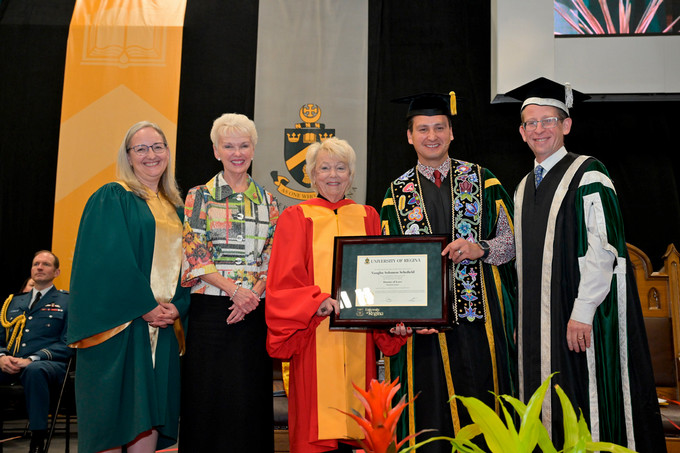
Dr. Vaughn Solomon Schofield
Born and raised in Regina, Dr. Vaughn Solomon Schofield, SOM, SVM, CD, began her post-secondary studies at the University of Saskatchewan, Regina Campus before completing fashion merchandising at the Rae-Vogue School in Chicago. These early experiences shaped a career that crossed borders and bridged communities, from Saskatchewan to South America, and from business boardrooms to military bases.
In the 1980s, she chaired the board of a 200,000-member crime-prevention organization, travelling across North and South America to establish Crime Watch groups. Fluent in English and Spanish, she collaborated with governments and hosted a crime-prevention television show in Fort Lauderdale, twice being named Florida’s Crime Prevention Woman of the Year. Back in Canada, she became president and CEO of the Western Group of Companies.
Her legacy is defined by her commitment to public service. Appointed Saskatchewan’s 21st Lieutenant Governor in 2012, she devoted her six-year term to honouring military members. She created Canada’s only military service appreciation pin and personally presented more than 9,000 pins to Armed Forces personnel worldwide.
Beyond her military advocacy, she has also served on numerous boards and organizations, including SaskWater, SaskPower, and the Regina Airport Authority.
Dr. Vaughn Solomon Schofield received an Honorary Doctor of Laws (LLD) at Fall 2025 Convocation.
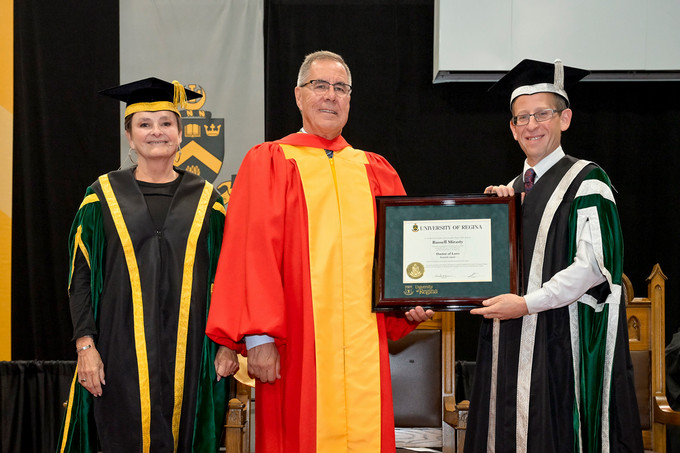
Dr. Russell Mirasty
Dr. Russ Mirasty, a member of the Lac La Ronge Indian Band and a fluent Cree speaker, is recognized as Saskatchewan’s first Indigenous Lieutenant Governor. Born and raised in La Ronge, he grew up deeply connected to Cree culture, shaping his lifelong commitment to public service and leadership.
He joined the RCMP in 1976 as one of only two Indigenous cadets of his troop. Over a distinguished 36-year career, he served in seven provinces and rose to assistant commissioner—the first Indigenous person to serve as a commanding officer. He was widely respected for promoting respectful policing, strengthening cross-cultural understanding, and mentoring Indigenous recruits. After retiring in 2013, he continued contributing to provincial and national initiatives focused on youth and education.
Appointed Lieutenant Governor of Saskatchewan in 2019, Dr. Mirasty served until 2024. His tenure was praised for humility, accessibility, and dedication to reconciliation, youth empowerment, and literacy. His use of the Cree language in official events brought meaningful representation and inclusivity.
Alongside his wife, Donna, he remains active in community work, inspiring future leaders grounded in culture and service.
An Honorary Doctor of Laws (LLD) was awarded to Dr. Russ Mirasty at Spring 2025 Convocation.
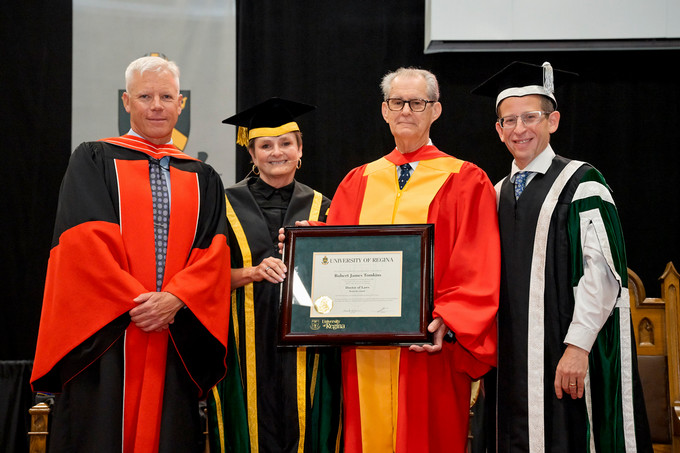
Dr. Jim Tomkins
Dr. Jim Tomkins has been a pillar of the University of Regina for more than five decades, contributing as a mathematics professor, administrator, and leader. His connection to the institution began in 1963 when he helped with construction on the then-new campus.
After completing a mathematics degree at the University of Saskatchewan and a master’s and PhD in statistics from Purdue University, he returned to Regina in 1969 to join the Department of Mathematics and Statistics. Over the next 37 years, he held numerous roles, including Vice-President (Administration) from 1998 to 2005, and was seconded to the Government of Saskatchewan as a senior policy analyst in post-secondary education from 1994 to 1998.
He later became the University of Regina’s sixth President and Vice-Chancellor (2007–2008) and its eighth Chancellor (2013–2019), presiding over Convocation and serving on the Board of Governors.
Dedicated to community service, he has served on the boards of Regina Palliative Care, the Canadian Red Cross Society, and the Saskatchewan Healthcare Employees’ Pension Plan. In 2023, he and his wife, Dr. Lynn Tomkins, received the Outstanding Philanthropist Award for their extensive charitable contributions.
An Honorary Doctor of Laws (LLD) was awarded to Dr. Tomkins at Spring 2025 Convocation.
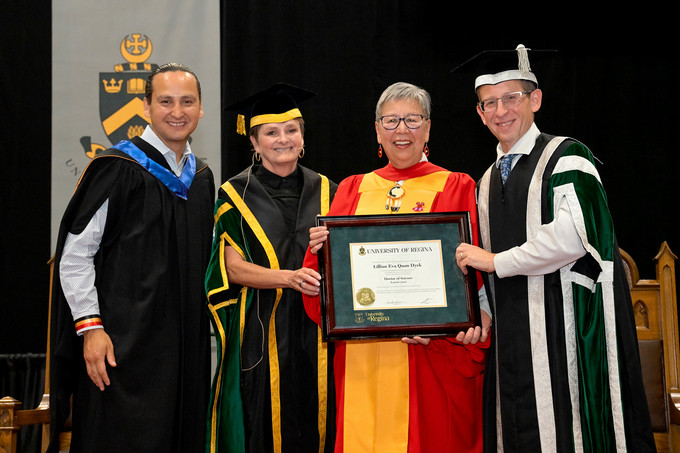
Dr. Lillian Eva Quan Dyck
Dr. Lillian Eva Quan Dyck, OC, is a pioneering neuroscientist, professor, and former Senator whose career has advanced science, education, and advocacy for Indigenous and women’s rights. Born in North Battleford, she is of Cree and Chinese heritage and a member of the George Gordon First Nation. She earned multiple degrees from the University of Saskatchewan, becoming the first Indigenous woman in Canada to receive a PhD in the sciences.
At the University of Saskatchewan, Dr. Dyck served as a professor of psychiatry and associate dean of Graduate Studies. Her research examined neurotransmitters linked to Alzheimer’s disease, depression, and schizophrenia. As one of few women in science during the 1980s, she championed equity, mentored Indigenous and women students, and co-chaired the Women’s Studies Research Unit.
Appointed to the Senate in 2005, she became the first female Indigenous Senator and the first Canadian-born Senator of Chinese descent. Throughout her 15-year tenure, she chaired the Senate Committee on Aboriginal Peoples and led efforts addressing missing and murdered Indigenous women and sex-based discrimination in The Indian Act.
Honoured with numerous awards, Dr. Dyck continues to inspire through her lifelong commitment to justice, education, and equality.
Dr. Lillian Quan Dyck received an Honorary Doctor of Science (DSc) at Spring 2025 Convocation.
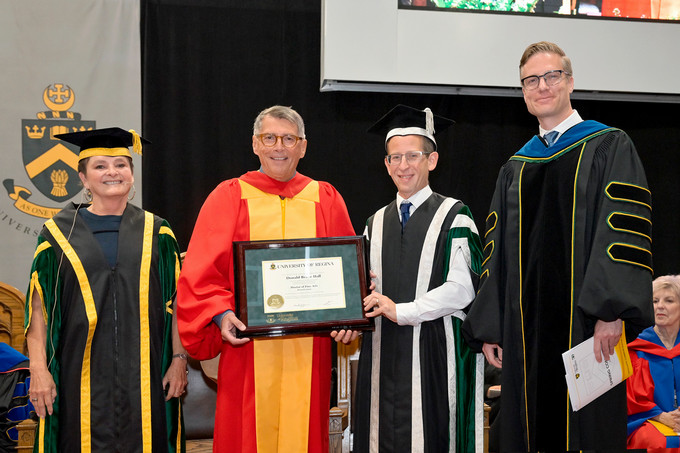
Dr. Don Hall
For more than 40 years, Dr. Don Hall served as the University of Regina’s photographer, capturing campus life with exceptional artistry, skill, and compassion. From Convocation ceremonies to athletics and major events, his images documented the University’s growth and shaped its public identity. His photography appears in countless publications, recruitment materials, and exhibitions, forming a rich visual history of the institution.
Born and raised in Saskatchewan, Dr. Hall studied at the University of Saskatchewan’s Regina Campus from 1968 to 1970 before completing photography training at the Northern Alberta Institute of Technology. Known for his calm and respectful presence, he built trust with everyone he photographed—from new students to visiting dignitaries—creating thousands of memorable images that tell both personal stories and the University’s story.
He taught photography at the University from 1976 until his retirement, a role he found deeply rewarding. Beyond campus, he became one of Saskatchewan’s leading fine art photographers, with work featured in major collections including the Glenbow Museum, Remai Modern, Mackenzie Art Gallery, and the Canada Council Art Bank.
Retiring in 2016, Dr. Hall leaves a legacy as an artist, educator, and storyteller whose work continues to inspire.
Dr. Don Hall received an Honorary Doctor of Fine Arts (DFA) at Spring 2025 Convocation.